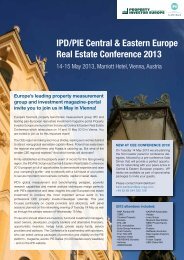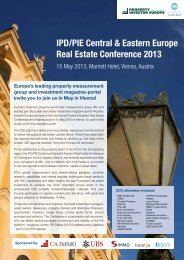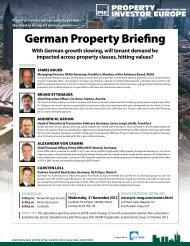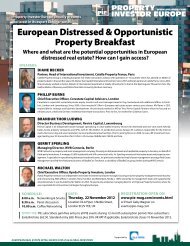PIe French Property Breakfast sees La Défense, Grand Paris ...
PIe French Property Breakfast sees La Défense, Grand Paris ...
PIe French Property Breakfast sees La Défense, Grand Paris ...
Create successful ePaper yourself
Turn your PDF publications into a flip-book with our unique Google optimized e-Paper software.
french <strong>Property</strong> <strong>Breakfast</strong><br />
PIE <strong>French</strong> <strong>Property</strong> <strong>Breakfast</strong> <strong>sees</strong> <strong>La</strong> Défense,<br />
<strong>Grand</strong> <strong>Paris</strong> muddying waters, but market rising<br />
<strong>Property</strong> Investor Europe on 28 April 2010<br />
brought together six experts to discuss<br />
the outlook for investment in the <strong>French</strong><br />
property market. Held in the offices of DLA Piper<br />
in London’s City business district, PIE’s <strong>French</strong><br />
<strong>Property</strong> <strong>Breakfast</strong> attracted nearly 80 participants.<br />
Panellists were (left to right): Maryse Aulagnon,<br />
CEO of Affine; Jean-Paul Dumortier, CEO of<br />
Foncière <strong>Paris</strong> France and President of the FSIF<br />
association of listed real estate firms; Ranald<br />
Hahn, Managing Director-Southern Europe, Prologis<br />
Europe; PIE’s Allan Saunderson; Philippe Le<br />
Trung, Director of Capital Markets, Foncière des<br />
Régions; Robert Waterland, MD, Société de la<br />
Tour Eiffel; Stéphane Theuriau, Joint CEO Commercial<br />
<strong>Property</strong>, Altarea Cogedim. The following<br />
is a resumé of the main topics discussed and<br />
the experts’ views on them.<br />
Fonciere des Regions’ Head of<br />
Capital Markets Philippe Le<br />
Trung (top) and Affine Founder<br />
Maryse Aulagnon: “cap rates<br />
have stabilised”.<br />
<strong>La</strong> Défense weighed down<br />
by high costs, oversupply<br />
The <strong>La</strong> Défense business district in <strong>Paris</strong> faces difficulties<br />
in attracting new investment despite ambitious<br />
plans for new towers, with high costs likely to<br />
outweigh achievable rents, according to panellists at<br />
PIE’s <strong>French</strong> <strong>Property</strong> <strong>Breakfast</strong>.<br />
“The big issue for <strong>La</strong> Défense is the hiatus between<br />
the cost of construction of a high rise building, with<br />
all the specifications that we need now, versus the actual<br />
achievable economic rent,” said Altarea Cogedim’s<br />
Stéphane Theuriau. It will be difficult to achieve<br />
yields of more than 7%-7.25% for a new building in<br />
the area and there are real fears that oversupply will<br />
keep a cap on rents, he said. “We don’t think that the<br />
risk-reward for the investors is there.”<br />
FPF’s Jean-Paul Dumortier said <strong>La</strong> Défense’s problems<br />
could benefit other areas. “The fact that <strong>La</strong><br />
Défense probably will grow more slowly in the future<br />
than it did before will have a good influence on other<br />
areas around <strong>Paris</strong>,” he said. Other areas being developed<br />
on the outskirts of <strong>Paris</strong> offer attractive locations<br />
at rents of €250-€350 per sq.m., he said. Robert<br />
Waterland also said that building in other outlying<br />
locations can offer a good economic alternative to <strong>La</strong><br />
Défense, where the transport system is already reaching<br />
saturation point. <strong>La</strong> Défense is in any case highly<br />
cyclical and the profitability of any investment is<br />
therefore very dependent on timing, he said.<br />
Affine’s Maryse Aulagnon agreed that the centre of<br />
<strong>La</strong> Défense is a high risk investment but said that<br />
there are areas at the edge which offer a more reasonable<br />
risk profile. Affine is involved in a residential development<br />
there which has been selling well even during<br />
the recent market crisis, she said. Foncière des<br />
Régions owns the CB 21 tower in <strong>La</strong> Défense and<br />
FdR’s Philippe Le Trung was more optimistic about<br />
the outlook for the area than other panellists. The size<br />
of <strong>La</strong> Défense - three times that of London’s Canary<br />
Wharf - means it attracts big-name tenants and offers<br />
good opportunities for large investors, he said. pie<br />
FSIF <strong>sees</strong> alternatives to<br />
<strong>Grand</strong> <strong>Paris</strong> tax<br />
The <strong>French</strong> listed property association FSIF is backing<br />
a number of alternatives to the capital gains tax<br />
currently being proposed to finance the <strong>Grand</strong> <strong>Paris</strong><br />
Photos: Barry Rohde<br />
40<br />
property investor europe l Edition 164 l May 2010 l www.pfeurope.eu
plan for the transformation of the Greater <strong>Paris</strong> area,<br />
FSIF President Jean-Paul Dumortier told PIE’s<br />
<strong>French</strong> <strong>Property</strong> <strong>Breakfast</strong>.<br />
The FSIF (Fédération des Sociétés Immobilières et<br />
Foncières) has led the charge against the <strong>French</strong> Senate’s<br />
proposal for a 15% capital gains tax on property<br />
benefiting from new transport networks which form<br />
part of the plan. “The story is not over. I think we will<br />
try to persuade the government not to finance <strong>Grand</strong><br />
<strong>Paris</strong> that way, but to choose something that could be<br />
more simple, maybe to add some more taxes to the<br />
transaction, maybe to create a specific but low rate of<br />
taxation of the rents,” said Dumortier.<br />
A financial solution is needed because the transport<br />
improvements will cost around €30bn over 15<br />
years, he acknowledged. But he said the Senate’s proposal<br />
to impose a tax on property a set distance from<br />
a station would create a perverse situation in which<br />
some buildings are subject to the tax while those on<br />
the other side of the street are exempt.<br />
Maryse Aulagnon said a tax of the kind proposed<br />
could cancel out some of the transparency gains resulting<br />
from the creation of the <strong>French</strong> SIIC/REIT<br />
regime in 2003. “It is just going backwards to 10 years<br />
ago,” she said. Despite the tax issue, the <strong>Grand</strong> <strong>Paris</strong><br />
transport improvements have got to be good news for<br />
the real estate sector, said Stephane Theuriau. But<br />
while the project will create new business districts,<br />
this will hit struggling development areas further outside<br />
<strong>Paris</strong> such as Marne-la-Vallee, he said. pie<br />
available, although the cost of financing is currently<br />
too high, but Dumortier said the worst of the sector’s<br />
financing problems are over. “I think these difficulties<br />
are behind us. We can access loans at reasonable<br />
spreads, which is new.”<br />
The outlook for the property market is also crucially<br />
dependent on the broader pace of the economic<br />
recovery. “ We know from experience that if you’ve<br />
got 2% GNP growth or higher, you’ve got net employment<br />
growth and net absorption in the office<br />
market,” said Waterland. “If in two years time, you’re<br />
hitting 2.5% GNP growth, it will be a very rapid<br />
turnaround in the market.”<br />
And as demand picks up, there is a risk of a shortage<br />
of new property in a few years time, after construction<br />
came to a halt during the recent crisis. “We<br />
are going headfirst to the next property crisis because<br />
there is going to be an acute shortage of good quality<br />
space in three years time,” said Waterland. Only<br />
200,000 sq.m. of new office space is currently in the<br />
pipeline for the <strong>Paris</strong> region in 2012, he noted.<br />
Stephane Theuriau agreed that the halt in construction<br />
since 2008 will lead to a dearth of quality space<br />
in a few years time, but said that 1.0m-1.2m sq.m.<br />
due to be delivered over the next 18 months will<br />
weigh on rents in the near term. pie<br />
<strong>French</strong> property now<br />
post-crisis, improving<br />
The <strong>French</strong> property market is starting to show signs of<br />
improvement after the difficulties of the past two years,<br />
panellists at PIE’s <strong>French</strong> <strong>Property</strong> <strong>Breakfast</strong> said.<br />
“Things are coming along a little bit better. There<br />
are some signs in the market that cap rates for instance<br />
have stabilised and in some areas are again diminishing,<br />
which is a very good sign,” said Maryse Aulagnon.<br />
Philippe Le Trung said many corporate clients<br />
were not able to commit to new property rentals last<br />
year, but this appears to be changing in 2010.<br />
Ranald Hahn said Prologis is now investing again<br />
after a very difficult 2008 and 2009, when it had to<br />
sell assets. Jean-Paul Dumortier said Foncière <strong>Paris</strong><br />
France would also like to invest more, but it is difficult<br />
to find the right product at the right price.<br />
Significantly, financing is becoming easier to access,<br />
although constraints still apply. “It’s getting<br />
slightly better all the time...but it’s far from satisfactory,”<br />
said Robert Waterland. Le Trung said credit is<br />
Société Tour Eiffel MD Robert Waterland (top left)enjoys the analysis of Altarea Cogedim Joint CEO<br />
Stéphane Theuriau. ProLogis MD North Ranald Hahn (top right) and Foncière <strong>Paris</strong> France’s Jean-Paul<br />
Dumortier (above, centre) deliver some fascinating analysis. Audience questions (left) were welcome.<br />
property investor europe l Edition 164 l May 2010 l www.pfeurope.eu 41
french <strong>Property</strong> <strong>Breakfast</strong><br />
“If in two years time you’re<br />
hitting 2.5% GNP growth,<br />
there will be a very rapid<br />
turnaround in the office<br />
market,”observed Tour<br />
Eiffel’s Robert Waterland<br />
(second right). Altarea’s<br />
Stéphane Theuriau (far<br />
right) had his own views.<br />
Beni Stabili change ends<br />
FdR shareholder pact<br />
The decision by Foncière des Régions’ leading shareholders<br />
to end their shareholder pact relates to the<br />
company’s move to make its Italian subsidiary Beni<br />
Stabili more independent, said Philippe Le Trung,<br />
head of capital markets for the company.<br />
Batipart, controlled by FdR founder Charles Ruggieri,<br />
and Delfin - controlled by Italian industrialist<br />
Leonardo Del Vecchio - in March ended the pact by<br />
mutual agreement but gave no explanation for the<br />
decision. Le Trung said the agreement was put together<br />
when FdR bought Beni Stabili, in order to<br />
manage the combination of the two companies. As<br />
FdR is now reducing its stake in Beni Stabili, the<br />
agreement is coming to an end.<br />
FdR is proposing to pay part of its dividend in the<br />
form of Beni Stabili shares, which will reduce its stake<br />
in the Italian company to around 52% from 68%<br />
now, creating greater transparency and marking a key<br />
step towards the adoption of REIT/SIIQ status by<br />
Beni Stabili.<br />
Le Trung said the end of the pact will be welcomed<br />
by minority shareholders. “From a minority shareholder<br />
point of view, the less that this sort of special<br />
agreement exists, then the better it is for the valuation<br />
and the strategy of the company,” he said. Batipart<br />
holds a 14.1% stake in the company while Delfin,<br />
holds 21.6%. He also refuted a suggestion that<br />
Del Vecchio is aiming to reduce his activities on age<br />
grounds, saying the Delfin has stocked up about 2%<br />
of equity in recent months. pie<br />
<strong>French</strong> REIT Altarea in<br />
talks to buy Cap 3000 mall<br />
<strong>French</strong> shopping centre REIT/SIIC Altarea Cogedim<br />
and its shareholders Predica and ABP have entered<br />
exclusive negotiations with retail group Galeries<br />
<strong>La</strong>fayette to buy a controlling stake in its Alteda<br />
mall unit. Alteda’s main asset is the prime Cap 3000<br />
mall in Saint-<strong>La</strong>urent du Var in the south, which<br />
boasts the second best per sq.m. sales in France.<br />
Altarea deputy CEO Stéphane Theuriau told<br />
PIE’s <strong>French</strong> <strong>Property</strong> <strong>Breakfast</strong> that Cap 3000 has<br />
proven its ability to drive sales very meaningfully<br />
over the past 25 years and it offers a good fit for<br />
Altarea, which hopes to be able to help its own institutional<br />
investors realise the full potential of the<br />
asset. He declined to give details of price, or the<br />
negotiations.<br />
Galeries <strong>La</strong>fayette currently owns 99.8% of Alteda.<br />
Galeries <strong>La</strong>fayette and Altarea said they cannot prejudge<br />
the outcome of the negotiations but will make<br />
a full announcement once the talks are completed.<br />
Altarea mainly develops and invests in shopping centres,<br />
with a portfolio of €2.3bn and a pipeline valued<br />
at €1.5 bn. Some 80% of its retail portfolio is in<br />
France and 15% in Italy. It also develops office and<br />
residential property for third parties. pie<br />
Photos: Barry Rohde<br />
42<br />
property investor europe l Edition 164 l May 2010 l www.pfeurope.eu








